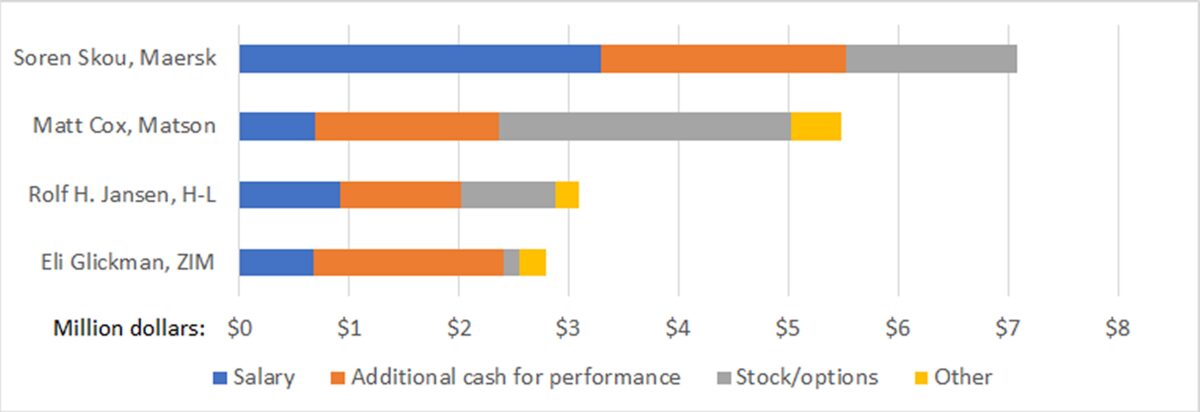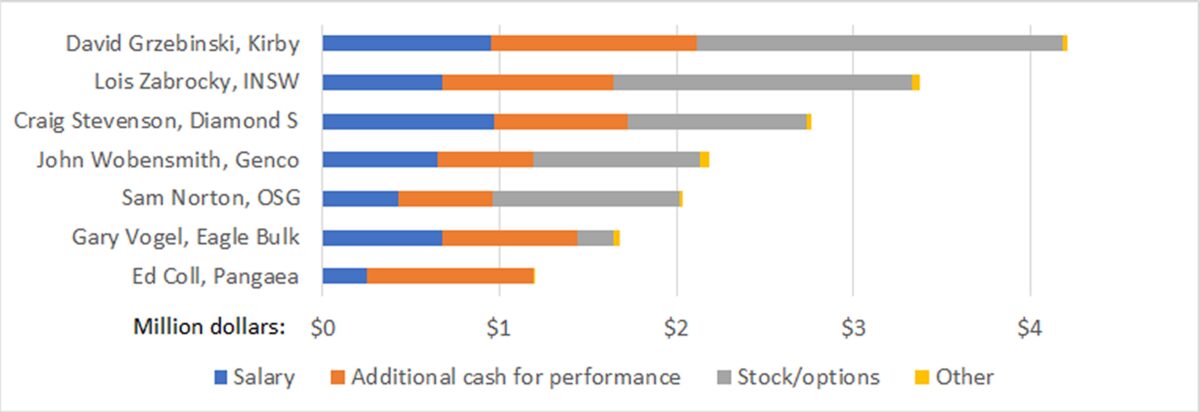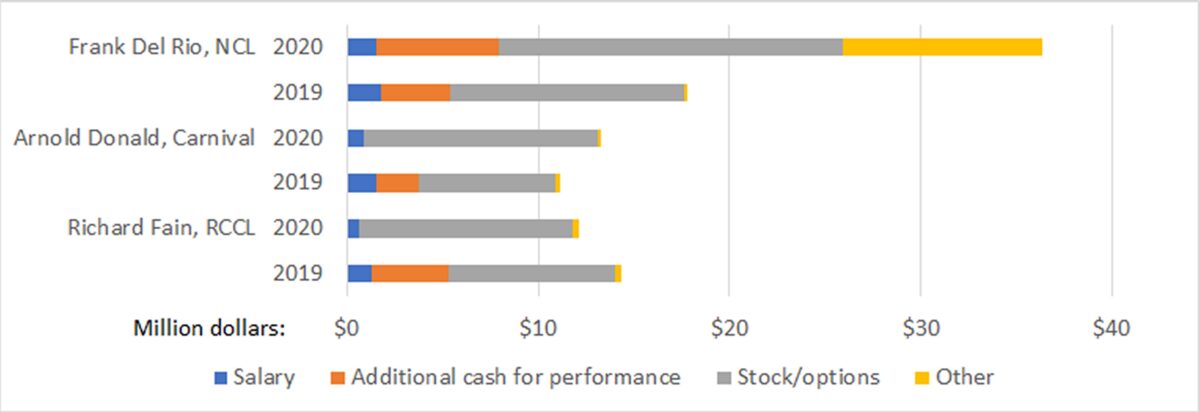Shipping magnates don’t pervade the billionaire ranks like they did in the days of Aristotle Onassis. They’ve been left behind by tech bosses, financiers and oligarchs. Yet ocean shipping is still big business and the CEOs overseeing the fleets are high earners.
So, how much do shipping CEOs actually make?
While many shipping companies aren’t required to list individual executive compensation, a number of them are, whether in annual reports or in proxy submissions prior to annual general meetings. American Shipper compiled the available public information on executive compensation across container shipping, dry bulk, tankers and cruise shipping.
Liner shipping
Annual remuneration is a combination of salary, shares and/or options, performance-based cash payments and other cash and benefits. For shares and options, the equity value is estimated at the time of the award and may change significantly by the time shares are cashed in.
Denmark-listed Maersk is the largest container liner operator in the world (excluding newbuild tonnage), at least for the next few months until MSC takes the crown. Maersk CEO Soren Skou made 43.1 million Danish kroners in 2020 ($7.1 million), up 24% from 2019 remuneration (using end-of-year currency conversions).
Germany-listed Hapag-Lloyd is the world’s fifth-largest liner company, according to Alphaliner. The company has a current market cap of $39 billion. Hapag-Lloyd CEO Rolf Habben Jansen received total compensation of 2.5 million euros last year ($3.1 million), up 23% from $2.5 million in 2019.
ZIM (NYSE: ZIM), which went public in the U.S. in January, is the 11th largest liner company in the world. With a market cap of $4.8 billion, it is the largest shipping company (excluding cruise companies) in the U.S. public market. Its CEO, Eli Glickman, made $2.18 million last year.
Underscoring the difference between U.S. and European executive pay, Matthew Cox, CEO of Hawaii-based Matson (NYSE: MATX), earned $5.5 million in 2020, up around $1 million or 22% from 2019. Cox made far more than Habben Jansen last year, despite the fact that Hapag-Lloyd is a much larger company; Matson is the world’s 25th largest liner operator, with a market cap one-thirteenth of Hapag-Lloyd’s.

Bulk commodity shipping
Most of the bulker and tanker owners listed in the U.S. are foreign filers, meaning that they only have to disclose the aggregate compensation of their executive teams.
Among the U.S.-listed bulk shipping companies that are required to disclose individual compensation numbers, the largest by market cap is tank-barge operator Kirby Corp. (NYSE: KEX) and predictably, its CEO, David Grzebinski, tops the compensation list. His cash and stock remuneration totaled $4.2 million in 2020, down 11% versus 2019.
Lois Zabrocky, CEO of crude and product tanker owner International Seaways (NYSE: INSW), had 2020 compensation of $3.4 million, up 20% from 2019. Craig Stevenson, CEO of crude and product tanker owner Diamond S Shipping (NYSE: DSSI), earned $2.8 million last year, down 28% from 2019. International Seaways is in the process of merging with Diamond S Shipping. Zabrocky will remain CEO and Stevenson will depart. His exit package is valued at $5.4 million.
The 2020 compensation of John Wobensmith, CEO of dry bulk company Genco Shipping & Trading (NYSE: GNK), was valued at $2.2 million, down 8% year on year. Sam Norton, CEO of Jones Act tanker company OSG (NYSE: OSG), earned $2 million, up 2% year on year.
Gary Vogel, CEO of Eagle Bulk (NASDAQ: EGLE), received compensation valued at $1.7 million last year, down 35% from 2019. Ed Coll, CEO of dry bulk company Pangaea Logistics (NASDAQ: PANL), earned $1.2 million, down 21% year on year.
In general, top executives of listed bulk commodity shipowners with disclosed earnings had more of their compensation in the form of equity versus cash and saw more compensation declines in 2020 than liner execs.

Among the foreign-filer companies that disclosed aggregate compensation for executive teams, most reported 2020 remuneration in the range of $2 million to $3 million. There was one big outlier: Scorpio Tankers (NYSE: STNG).
Scorpio Tankers has six senior executives led by CEO Emanuele Lauro and President Robert Bugbee. Last year, the executive team received compensation in cash and stock of $33.2 million. In 2019, executives received $32.5 million and in 2018, $25.8 million. (Furthermore, five of Scorpio Tankers’ execs are also execs at the former Scorpio Bulkers, now Eneti [NYSE: NETI], where they earned several additional millions of dollars in aggregate compensation per year.)

An important caveat to shipowner compensation is that in several cases, particularly with Greek companies, the CEO is the head of the private sponsor of the public entity. The sponsor can, in some cases, earn significant income from related-party transactions with the public company for commercial and technical management services and asset deals — a lot more income than a non-sponsor shipping CEO could make.
Cruise shipping
Executive compensation in the cruise sector is on a whole different — much higher — level than in commercial shipping. CEO annual compensation is in the eight digits, not seven.
The cruise industry suffered a near-death experience in 2020 due to COVID and the jury’s still out on its fate. COVID had major effects on CEO compensation.
Richard Fain, CEO of Royal Caribbean Ltd. (NYSE: RCL), took a 49% salary cut in last year and voluntarily declined $3 million in incentive-plan cash compensation. His overall compensation totaled $12.1 million, but 92% of his compensation last year was in stock — the future value of which depends on what happens in the cruise sector. The cash portion of his compensation fell 84% versus 2019.
Arnold Donald, CEO of Carnival Corp. (NYSE: CCL), took a 43% salary cut and, like Fain, did not receive incentive-plan cash compensation. His overall compensation increased 19% year on year in 2020, to $13.3 million. But this was entirely due to stock grants. His cash compensation decreased 73% year on year.
Not so for Frank Del Rio, CEO of NCL (NYSE: NCLH). His overall compensation increased 104% in 2020, to a jaw-dropping $36.4 million. The cash portion of his compensation increased 228%, not only due to an inducement bonus that will be clawed back if he doesn’t stay until the end of this year, but also due to a $10.3 million cash payout to a previous employment contract.

To put Del Rio’s pay in perspective, NCL’s market cap is less than one-fifth of Maersk’s, but Del Rio earned over five times more than Skou did last year.
During the NCL annual general meeting on May 20, shareholders conducted a non-binding vote on Del Rio’s compensation. It was a landslide, albeit a symbolic one: 83% of the votes opposed it.
Click for more articles by Greg Miller








